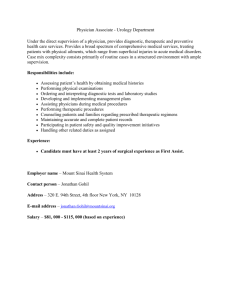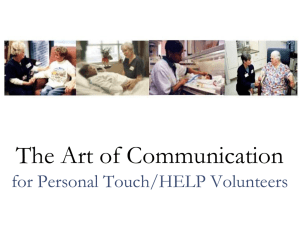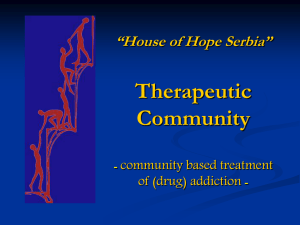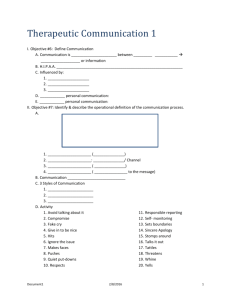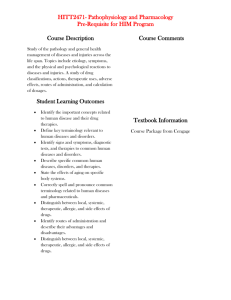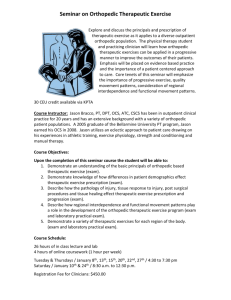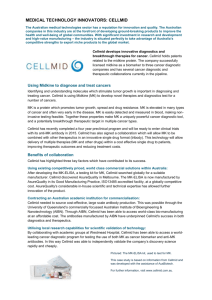Position Paper on the Promotion of Therapeutic Goods
advertisement
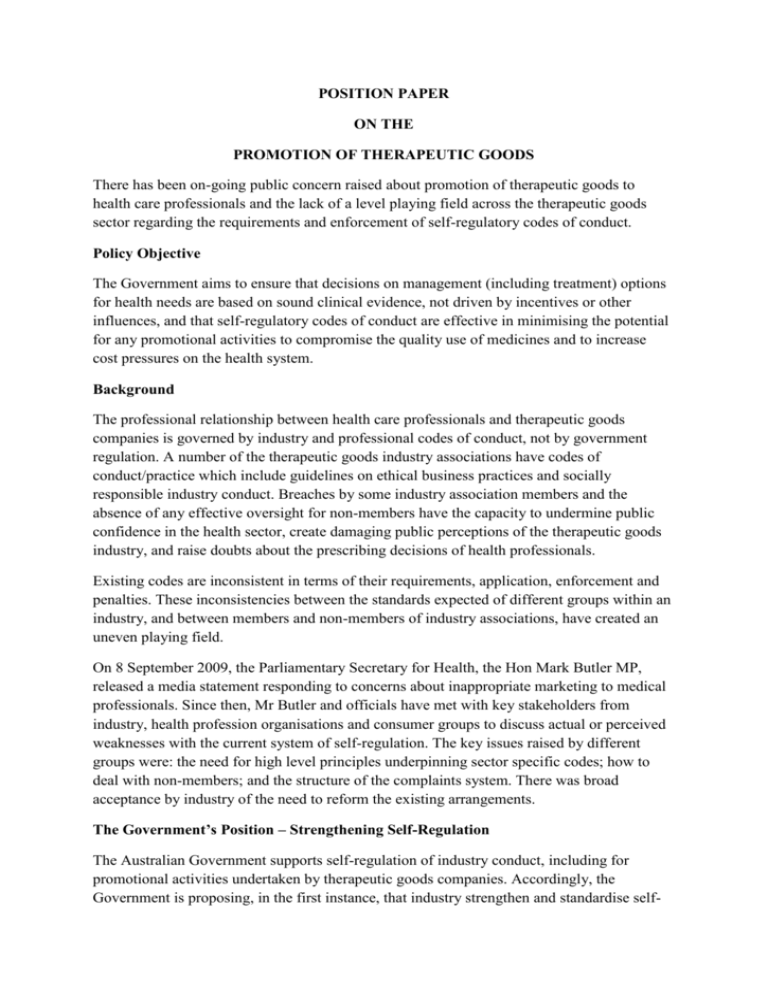
POSITION PAPER ON THE PROMOTION OF THERAPEUTIC GOODS There has been on-going public concern raised about promotion of therapeutic goods to health care professionals and the lack of a level playing field across the therapeutic goods sector regarding the requirements and enforcement of self-regulatory codes of conduct. Policy Objective The Government aims to ensure that decisions on management (including treatment) options for health needs are based on sound clinical evidence, not driven by incentives or other influences, and that self-regulatory codes of conduct are effective in minimising the potential for any promotional activities to compromise the quality use of medicines and to increase cost pressures on the health system. Background The professional relationship between health care professionals and therapeutic goods companies is governed by industry and professional codes of conduct, not by government regulation. A number of the therapeutic goods industry associations have codes of conduct/practice which include guidelines on ethical business practices and socially responsible industry conduct. Breaches by some industry association members and the absence of any effective oversight for non-members have the capacity to undermine public confidence in the health sector, create damaging public perceptions of the therapeutic goods industry, and raise doubts about the prescribing decisions of health professionals. Existing codes are inconsistent in terms of their requirements, application, enforcement and penalties. These inconsistencies between the standards expected of different groups within an industry, and between members and non-members of industry associations, have created an uneven playing field. On 8 September 2009, the Parliamentary Secretary for Health, the Hon Mark Butler MP, released a media statement responding to concerns about inappropriate marketing to medical professionals. Since then, Mr Butler and officials have met with key stakeholders from industry, health profession organisations and consumer groups to discuss actual or perceived weaknesses with the current system of self-regulation. The key issues raised by different groups were: the need for high level principles underpinning sector specific codes; how to deal with non-members; and the structure of the complaints system. There was broad acceptance by industry of the need to reform the existing arrangements. The Government’s Position – Strengthening Self-Regulation The Australian Government supports self-regulation of industry conduct, including for promotional activities undertaken by therapeutic goods companies. Accordingly, the Government is proposing, in the first instance, that industry strengthen and standardise self- regulation through developing an industry framework for universal adherence to consistent industry-wide codes based on a common set of high level principles. While this is the preferred approach, if consistent arrangements are not realised, then legislative options consistent with the Government’s policy objectives, including universal coverage and consistency across the sector, could be put in place in 2012. This could include enforcement arrangements to ensure compliance with these objectives. The Australian Government expects the arrangements that underpin the relationship between the therapeutic goods industry and health care professionals are appropriately regulated to minimise the possibility of undue influence in the decisions of health care professionals to prescribe, dispense, supply or purchase products and to ensure that independent medical decision-making is maintained. Common Principles The set of high level principles to be developed by industry will provide clear expectations for the conduct of promotional activities by companies in the therapeutic goods industry. They might cover: common core standards; principles of conduct including specific elements required for each code; and governance arrangements such as compliance training, reporting and independent complaint mechanisms. Achieving consistency would require industry associations to review their codes and revise them, as necessary, to align with the high level principles. Scope The Australian Government expects all sponsors of high-risk therapeutic products -both members and non-members of industry associations - will comply with a relevant code of conduct. The application process for the registration of these products on the Australian Register of Therapeutic Goods would provide an opportunity for sponsors to nominate the code with which they intended to comply. In this way, those companies within the therapeutic goods sectors (ie prescription medicines, higher risk over-the-counter medicines and higher risk medical devices) more likely to direct promotional activities to health care professionals will be the primary target group. Promotion of lower risk listed therapeutic goods will continue under the current selfregulatory arrangements. This however, could be reviewed at a later stage. Non-members of industry associations will not be obliged to become members to elect to be covered by a code. Complaints about potential breaches of a code by a non-member could be referred to the relevant code of conduct committee for investigation and determination. Reciprocal Arrangements with Health Care Professionals The therapeutic goods industry and health care professionals participate in a two-way relationship and, for that reason, there is a need to ensure the standards for conduct of health care professionals align with the standards expected of the therapeutic goods industry. Health care professional groups (including medical groups, pharmacists and nurses) are often subject to their own codes of conduct which include provisions for ensuring that there is no conflict of interest in participating in promotional activities offered by the therapeutic goods industry. Australia’s new National Registration and Accreditation Scheme begins on 1 July 2010. From this date, ten health professions will be regulated by nationally consistent legislation. Under this legislation, the Australian Health Practitioner Regulation Agency (AHPRA) is responsible for establishing general requirements for the development of health profession standards. In developing the high level principles, industry would be advised to collaborate with AHPRA to ensure consistent ethical standards for the interaction of health care professionals with the therapeutic goods industry. Government Endorsement Government endorsement of the high level principles will rely on them being consistent with the objectives and principles of the National Medicines Policy (NMP). Further information on the NMP is available at: http://www.health.gov.au/internet/main/publishing.nsf/Content/National+Medicines+Policy1. As part of industry’s broad consultation process, and in line with the medicines industry’s responsibilities as a partner to the NMP, the draft principles will need to be presented to the NMP Committee for comment. The common core standards will also need to comply with the World Health Organization’s 1988 Ethical Criteria for Medicinal Drug Promotion and the Australian Competition and Consumer Commission’s Guidelines for Developing Effective Voluntary Industry Codes of Conduct. Conclusion The therapeutic goods industry is a mature industry which has previously demonstrated its commitment and ability to make self-regulation work. More effective self-regulation through the development and implementation of high level principles embedded in all codes could improve confidence that decisions on management of health needs are based on sound clinical evidence and not driven by incentives from the therapeutic goods industry. This will reduce pressure for additional government intervention. Comments / Inquiries Any comments on the Government’s Position Paper should be directed via e-mail to industrycodesofconduct@health.gov.au by Friday 30 July 2010. Alternatively, if you have any inquiries please telephone (02) 6289 8604.
